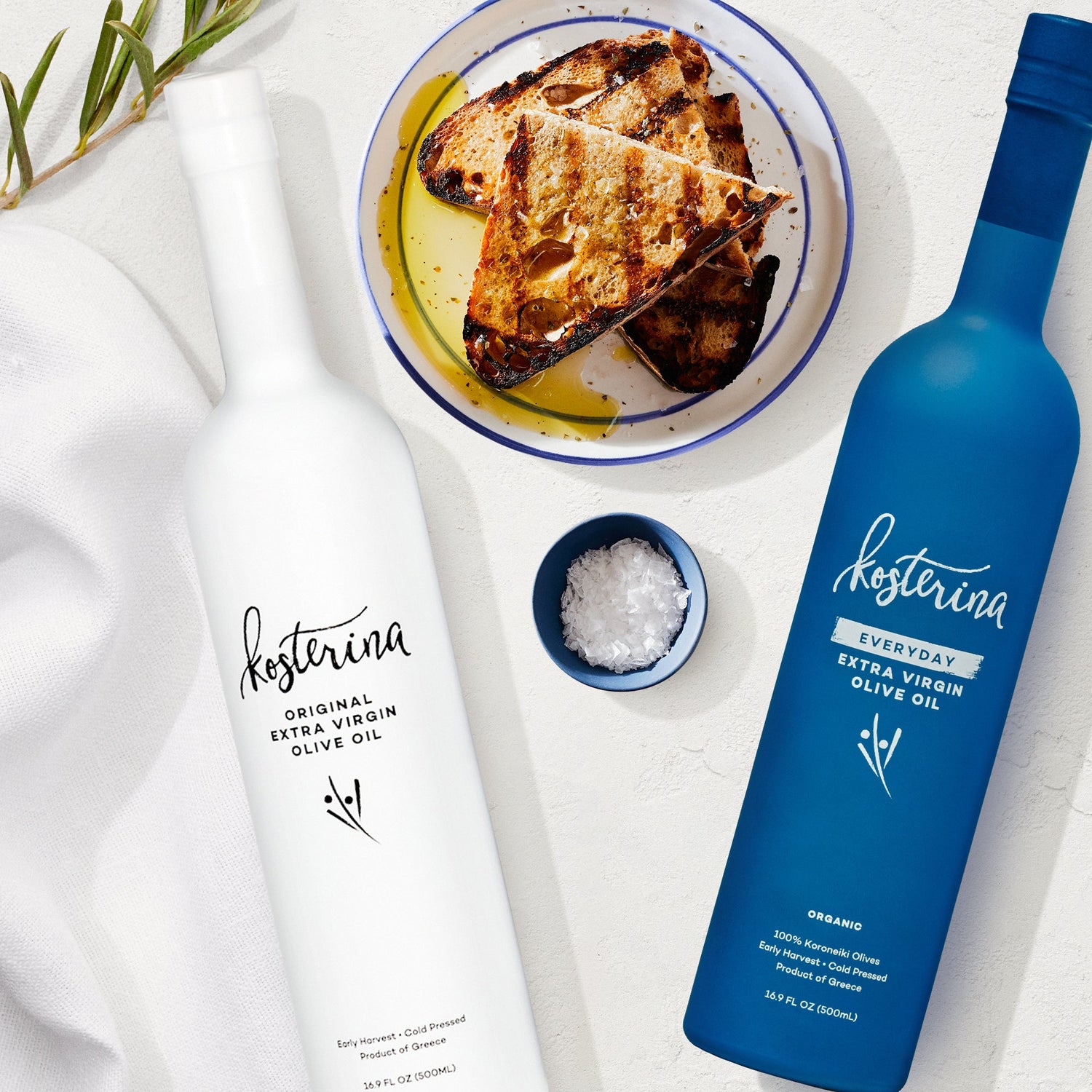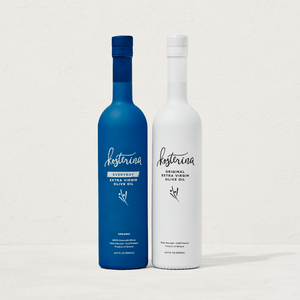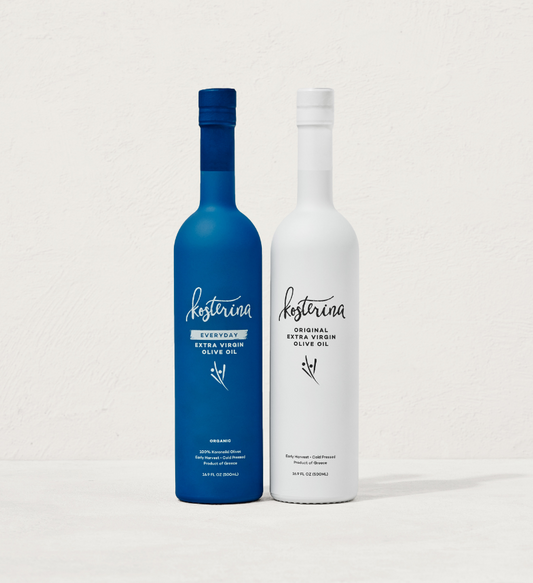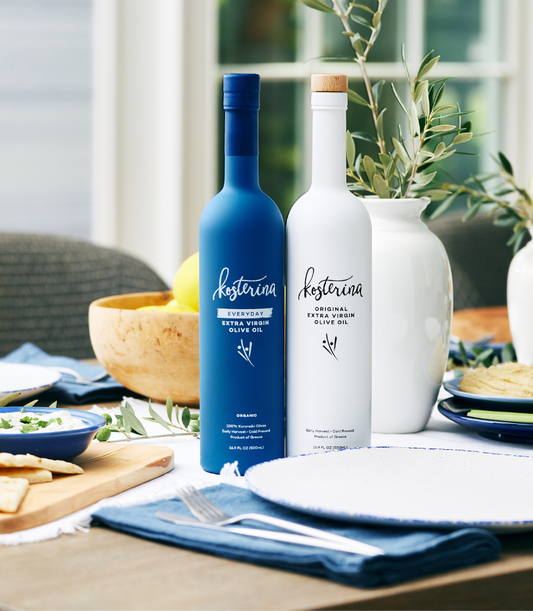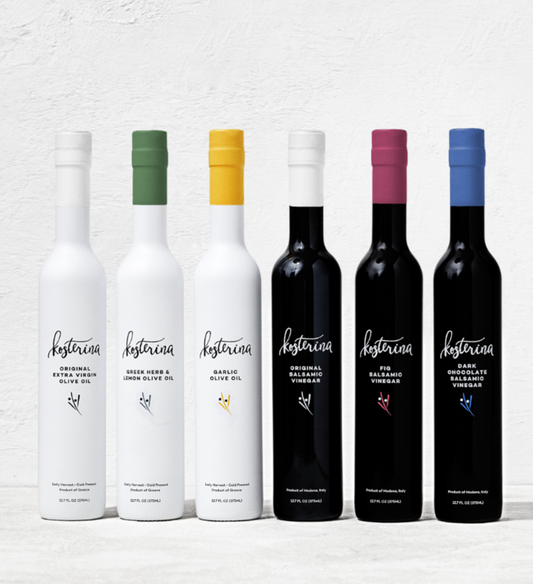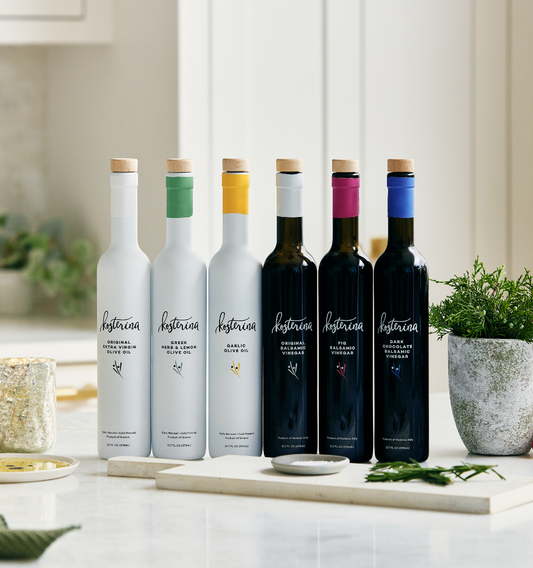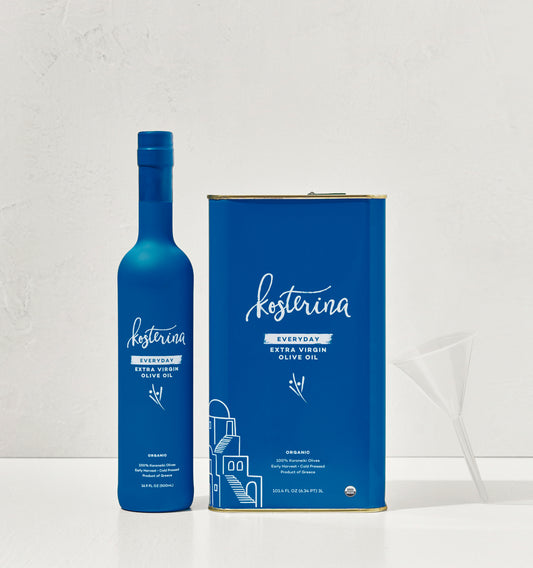Have you ever heard of an olive oil sommelier? Essentially, this title refers to someone who has gone through the rigorous process of learning all about olive oil. From simple tastings to understanding the molecular mechanisms of olive oil, an olive oil sommelier learns everything from start to finish of the olive oil process.
Here, all of your top olive oil questions are answered by Katina Mountanos, Kosterina founder, Olive Oil Sommelier, and Mediterranean lifestyle expert.
Is it safe to cook with olive oil?
YES! It is perfectly safe and healthy to cook with extra virgin olive oil. Despite common misconceptions in the United States, EVOO has a smoke point of over 425ºF, making it suitable for cooking, baking, and frying. But even more important than smoke point is the level of free radicals emitted when temperature is applied. EVOO emits the fewest levels of free radicals when heated.
Does olive oil cause weight gain?
In moderate amounts, olive oil does not contribute to weight gain and can, in fact, contribute to weight loss. Being rich in monounsaturated (healthy) fats, extra virgin olive oil can increase your levels of satiety and actually curb your appetite in the long run, leading to healthy weight management.
Plus, olive oil helps to fight inflammation, meaning less bloating and a healthier digestive system.
Is olive oil gluten-free?
Yes, olive oil is naturally gluten-free and safe for those with gluten sensitivities and celiac disease.
How should I store olive oil to keep it fresh?
Light and heat are the enemies of good olive oil. Over time, light can degrade olive oil and take away from its health benefits, as well as its flavor. For optimal results, keep your olive oil stored in a cool, dark place away from light (like your pantry) in a dark-colored glass bottle.
Why shouldn’t I buy olive oil packaged in plastic?
There has been extensive reporting on the dangers of microplastics for human health. Unfortunately, olive oil can be corrosive to plastic. In scientific terms, phthalates in plastic are fat-soluble, which means the oil molecules in olive oil can potentially bind to the oil molecules in plastic, causing the packaging to break down over time. This can contribute to microplastics leaching into your olive oil.
In addition, plastic packaging can lead to faster oxidation and degradation of extra virgin olive oil.
What is the difference between “Extra Virgin” olive oil and “regular” olive oil? What does “Extra Virgin” mean?
Extra virgin olive oil means it’s oil that comes from the first squeeze of the olive. It is cold-pressed (no heat is used in the process) and retains natural antioxidants and bioactive compounds, offering superior flavor and health benefits. Regular olive oil is more refined, resulting in a milder taste and reduced nutrient content.
Premium extra virgin olive oil is often an earlier harvest EVOO, meaning that olives are pressed before they are fully ripe. This means that polyphenols (the healthy antioxidants) are more plentiful, and the olive oil’s flavor is more robust.
What is a “blended” olive oil?
“Blended” can refer to a few things when it comes to olive oil.
First, let's be clear: some of the finest olive oils in the world are blends. Many premium EVOO brands combine different olive varieties to achieve a specific flavor profile or enhance polyphenol content. For example, blending a mild oil with an ultra-high-phenolic oil can boost health benefits or adjust the taste—making it either bolder or more delicate.
Compared to monovarietal EVOO, blending can be acceptable, but unfortunately, in some cases, blending can reduce oil quality due to increased exposure to factors like sunlight, heat, and extended transit times, potentially affecting freshness and nutritional value. And some olive oil blends are can be mixtures of previous harvest olive oils from various regions - this is where blends originally got a bad reputation. We recommend avoiding oils that blend olive oil and seed oils as seed oils can potentially trigger inflammation.
At Kosterina, our EVOO is monovarietal—never blended—featuring the Koroneiki olive variety for its naturally mild flavor and high polyphenol content.
Can I replace vegetable oil with olive oil in my recipes?
Yes! You absolutely can and you should. Olive oil is not only healthier, but it can actually add more complex flavor to whatever you are cooking or baking with. The idea that you can’t cook or bake with olive oil is a myth that has been debunked over and over again.
Does olive oil expire?
Yes, because olive oil is natural and pure, it does expire after a period of time. Over time, olive oil naturally starts to lose its robust flavor and polyphenol content, which can defeat its purpose. It is recommended to consume your olive oil within 18 months of purchasing it (unopened) and 3 months after you start consuming it (opened).
Is more expensive olive oil better in quality?
Not always but most likely, yes. When you squeeze a ripe olive, a lot of juice comes out. Olive oil is typically sold by the kilo, so most producers wait until olives are ripe to harvest. An unripe olive yields less juice from the squeeze but results in olive oil that’s much healthier and more potent in antioxidants. That’s why good olive oil is typically more expensive.
But a high price tag does not always indicate quality—it’s important to also check for factors like “harvest date” on the bottle (an early harvest date is usually around Nov/Dec, meaning more robust flavor and polyphenols), production methods (look for first-pressed, cold-pressed, organic farming methods), and the type of olive (look for single-origin olives, using only one type of olive).
Why does my olive oil taste bitter?
A “bitter” olive oil might actually be a sign that your olive oil is really good and healthy. Real extra virgin olive oil is rich in polyphenols, powerful antioxidants that protect your body from damage and contribute to the “bitter” sensation. This can also create a sort of “burn” in the back of your throat. The level of bitterness can vary based on the olive variety and time of harvest (the earlier the harvest, the more polyphenols, and therefore, the more “bitter”).
What you really want to avoid is olive oil that tastes, at best, neutral, and at worst, rancid. This can indicate that your olive oil is past it's peak freshness, meaning that you’re not getting the amazing flavor and health benefits that your olive oil has to offer.
Can I use olive oil for skincare?
Yes and no. Olive oil is rich in polyphenols, vitamin E, squalene, and other properties that can nourish your skin, but its high oleic acid content may make it too oily and occlusive for some. However, when formulated correctly to help your skin absorb all of the amazing benefits of EVOO, it can be a game-changer for glowing skin. At Kosterina, we formulate our skincare products with carrier oils that help to safely get those incredible benefits deeper into the skin without causing oiliness.
